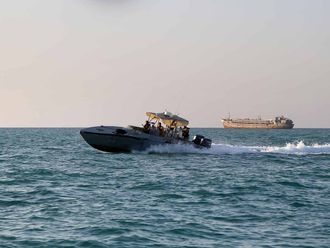Lebanon's electoral draft law, adopted by the Cabinet on Thursday, is expected to double the number of opposition MPs come May elections but the pro-Syrian politicians would still have the upper hand, according to analysts.
The draft, the first amendment to the country's controversial electoral law since the 1990 Taif Accord, which ended the civil war, has the backing of "at least 70 per cent" of the political factions, said George Nassif, senior writer at the influential An Nahar daily.
"There is something for everyone in it. It is the closest thing to a really representative electoral system," he told Gulf News on the telephone from his Beirut office yesterday.
He said the main opposition, the Qurnat Shahwan group, made up of anti-Syria Christian MPs and community leaders, was "very pleased" with the draft despite the failure to adopt two crucial points; lowering the voting age to 18 and allocating 30 per cent of parliamentary seats to women.
The draft, prepared by Interior Minister Suleiman Franjieh, a staunch pro-Syrian politician, was endorsed by the Cabinet on Thursday with the support of 23 ministers against the objection of three. It is similar to the electoral law of 1960, which set the Qadas (small electoral districts) as the basis for voting zones instead of the governorates. The proposed law has to be approved by the 128-member Parliament. Analysts expect it will be passed by the house.
The new system, to be applied in the upcoming May parliamentary elections, would benefit the opposition, they say.
The number of opposition members in the parliament, mainly from Qurnat Shahwan and the Druz leader Walid Jumablat block, could increase up to 55 from the current 29, according Nassif.
Both groups oppose the hands-on policy that has been exercised by Syria over their small country's affairs since the first Syrian troops entered Lebanon in 1976 in response to pleas from then president Suleiman Franjieh to stop the civil war that erupted that year.
Syria now has about 12,000 soldiers in the eastern part of Lebanon. A new resolution passed by the UN Security Council in October called on Damascus to withdraw its troops but it was rejected by both governments.
Syrian officials hinted earlier this week that their forces might leave Lebanon in two years. "The new electoral law, even though it is a good one, would also mean that Syrian domination will continue though the pro-Damascus majority in the Parliament," Nassif said, referring to the large blocks of Muslim leaders, like Prime Minister Omar Karami and speaker Nabih Berri. The Hezbollah group, which has eight members in the house, is also a staunch Syria ally. Nassif said the new division of districts in Beirut and most Muslim areas has been designed to keep Syria allies in power.
"Nevertheless, their will be some kind of challenge to the [Syrian-backed] authority," he added.












